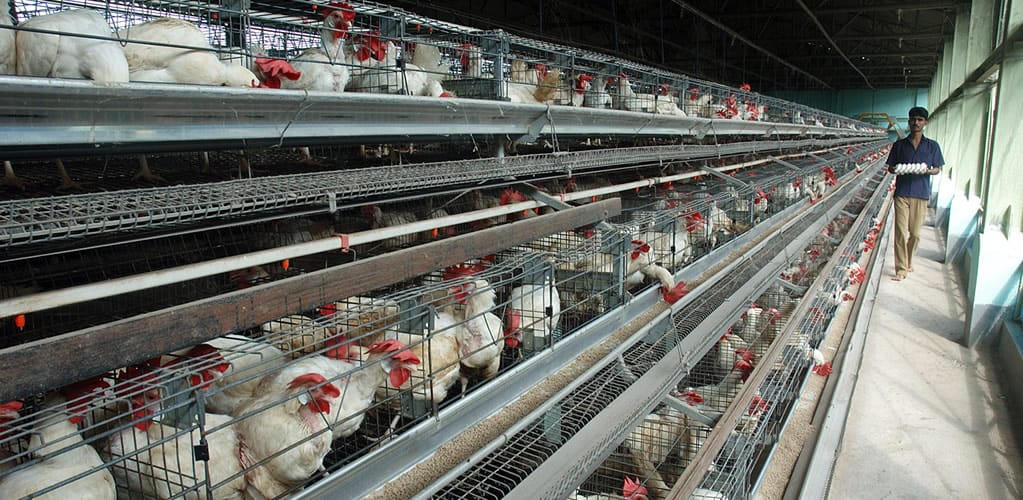‘A recipe for disaster’: What I learned going undercover on India’s chicken farms
Antibiotics crucial for human health are used to promote growth and prevent disease in Indian poultry farms, a practice that increases antibiotic resistance and poses major health risks.

Antibiotics crucial for human health are used to promote growth and prevent disease in Indian poultry farms, a practice that increases antibiotic resistance and poses major health risks.
L ast year, when I had an abscess on my lip, a doctor recommended I take amoxicillin. It didn’t work, so another doctor suggested we do a blood culture test to find out why. We found that the bacteria my body was fighting was resistant to amoxicillin and sensitive to doxycycline, another antibiotic.
In the last few months, I have once again encountered these antibiotics, along with others considered critically important for human medicine – not in my doctor’s surgery or a local pharmacy, but in my undercover reporting on chicken farms in India.
For our latest story, we visited farms and veterinary pharmacies in and around Telangana state, southern India, posing as aspiring farmers with a chunk of land. We also said we were hoping to start a YouTube channel on commercial chicken farming.
Our reporting revealed that Venky’s, one of India’s largest poultry producers, is marketing antibiotics to be used in two controversial farming practices: growth promotion and “preventative use”. Both can contribute to the spread of drug-resistant infections in humans.
Marketing antibiotics in this way is by no means limited to Venky’s. “All companies are the same,” one poultry farmer told me. “The smaller ones copy the guidelines from big companies.”
Our conversations with the owners of chicken farms tended to follow a pattern. They started by saying that chicken farming is a good investment opportunity. But as the conversation progressed, their confidence in the idea would fade.
Generally speaking, the owners set up the farms and all the equipment. They are provided with raw materials – chicks, feed, medicine – by a company, such as Venky’s, which can then buy birds from the farm for less than the market price. The rate is volatile and can change by the day. It is a process that often leaves the farmers counting the cost.
“We have been bearing the burden [of investment] for 20 years,” said another farmer. “We wonder why we have built these [sheds]. We sold seven to eight acres of farm lands to build these. If we had those seven to eight acres, [we could have made] a lot of money.” His land is no longer able to be cultivated.
Farm owners usually hire caretakers to run their farm, often a husband and a wife. Many have migrated from their homes in poorer states to escape poverty. They don’t speak the local language well and can be vulnerable to exploitation, experts say. Usually they live in a small room on the farm and they are paid a monthly wage for “maintenance”.
A large chunk of this maintenance work is instructed by a supervisor, who acts as a middleman between the company and the farm. They tell them what to feed the chickens and when. Caretakers are also responsible for administering various medicines to the birds.
One important job is to update the company’s supervisors about the number of chickens that die daily. At a farm we visited, there was a heap of dead chickens piled up between live ones. It was a public holiday and the infected pile would stay there at least until the supervisor returned to work to inspect them. The mortality rate can be up to 7%, one farm owner said.
Profits in broiler chicken farming largely depend on two factors: the mortality rate of the birds and their weight. The use of medication can influence both. While some drugs are used to prevent infections, others help the chicks gain weight. Many of these medicines are critically important to human health.
Despite this, we were able to buy some of these veterinary medicines over the counter. This might be shocking to some, but the indiscriminate sale and use of antibiotics over the counter isn’t unusual here – nor is it always legal. And antibiotics that humans rely on are usually sold over the counter too.
The misuse of these medicines is a “recipe for disaster”, an expert told me. In my case, all it meant was a slightly longer wait for a painful abscess to disappear. But the spread of drug-resistant infections holds far graver implications for those with more serious conditions.

GOING FURTHER:
Read the full investigation: Indian poultry giant selling antibiotics for growth promotion on farms | The Bureau of Investigative Journalism






[Read our Comments Guidelines]